The following translation from the Japanese-language autobiography entitled Aikido Jinsei (An Aikido Life) by Gozo Shioda of Yoshinkan Aikido is published with the kind permission of the author and the publisher, Takeuchi Shoten Shinsha. The series began with AIKI NEWS No. 72. Read the first part here.
Chapter 3: Aikido Is a Budo of Harmony
You cannot say that you will never encounter situations where the strong bully the weak or where someone acts in an unjust manner or where you yourself are exposed to danger. If you ever find yourself in these types of situations, you may of course control the opponent using the aikido you have learned. However, you should never lose your temper out of hate for the enemy. If that happens, you will lose your pure mental state which is important in aikido and won’t be able to execute proper techniques. You may suffer an unexpected defeat or, on the contrary, may go to an extreme while defending yourself which results in an unfortunate situation for you and your enemy. You should not forget that aikido is a budo of harmony.
Since I am five feet one-half inches tall and weigh only 110 pounds I was very often provoked into quarrels. In those situations I always tried to laugh my way out and avoid getting into trouble wherever possible. however, there were times when I had to deal with such situations.
A Drunken Man Falls into a Pond
I start out my day by getting up at 5:00 am and go for a walk with my dogs. Sometimes I ride a bicycle and sometimes I jog. One day I happened to be walking around a pond in Shakujii Park near my house. A big man approached me. It seemed that he had been drinking in the morning and he behaved in somewhat a strange manner. As he came closer I tried to avoid him by passing to the right but he moved to the same side as if to block me. When I shifted to the left he also moved to the left. Soon he came up to me as if to run into me and suddenly tried to seize me by the lapel. Since there was nothing else I could do I shook off his hand lightly and tried to walk on. Then I heard a splash and the man disappeared. He fell into the pond. I was a little surprised and went to the edge of the pond and asked if he was all right. The man was just trying to climb out of the pond by placing his hands on the edge. When I took a good look at him, I saw he had algae on his head which made him look like a water sprite (kappa). I felt a bit guilty not being able to suppress my laughter and offered my hand and pulled him out. I was relieved to know he wasn’t hurt but he, for his part, didn’t like what had happened and left the spot without a word.
Challenged to a Match by a Karate Teacher
There is nothing I can do about being very small since I was born that way and people probably think they can easily overcome me. Although it has been a nuisance, I used to sometimes be challenged to a match.
One day, a 6th dan Karate teacher came to the dojo with an introduction from an acquaintance and challenged me to a match. I reluctantly accepted his challenge. When I stood against him in the center of the dojo, he suddenly thrust at me with “Shokentsuki.” The moment he attacked I received his strike with my palm and blended with his fist. The teacher flew forward past me because the timing of his thrust and my movement were perfectly matched. Since that incident, I have been on friendly terms with him.
Mischievous Prank by Occupation Soldiers
The following incident occurred just after the war. At that time my house was located in Tokorozawa. I was on the way home on the last train of the Seibu Line, which in those days was still called the Musashino Line. Two drunken occupation soldiers got on this train. It was the time when the Occupation Army reigned and instances of intolerable behavior by soldiers were common. The soldiers on the train were amusing themselves by poking the heads or touching the noses of the Japanese. However, no one stopped them and they suffered the insult with lowered eyes. Soon one of the soldiers came up to me and tried to stroke my cheek with his right hand saying “Papa-san.” I grabbed his hand lightly with my left hand. Then he tried to do the same with his left hand. I grabbed it with my right hand and executed what we call the two-handed yonkajo technique firmly. The large man fell flat on the floor. Unfortunately for him there was a coat of oil on the wooden floor. His face and clothes became black as coal and he looked quite miserable. The soldiers must have really been surprised at this because they became quiet. I still remember the delighted look of all Japanese passengers I saw then.
You cannot say that you will never encounter situations where the strong bully the weak or where someone acts in an unjust manner or where you yourself are exposed to danger. If you ever find yourself in these types of situations, you may of course control the opponent using the aikido you have learned. However, you should never lose your temper out of hate for the enemy. If that happens, you will lose your pure mental state which is important in aikido and won’t be able to execute proper techniques. You may suffer an unexpected defeat or, on the contrary, may go to an extreme while defending yourself which results in an unfortunate situation for you and your enemy. You should not forget that aikido is a budo of harmony.
Japanese Woman Assaulted by Occupation Soldiers
In those days following the war Japanese in general were in a state of lethargy and you could not do anything about the Occupation Army. Even the Japanese police had a hard time handling them. I would like to relate one incident where I by chance witnessed an incident of high-handed behavior. It occurred on New Year’s Day 1947. That afternoon, the sun was still high and I was on the way back from visiting my relatives’ house after extending my new year’s greeting. When I neared Ebisu station I saw a bunch of people standing around the police box. I too peeped through out of curiosity and found a young housewife crying in front of a policeman. Gathering from the stories I heard she seemed to have been assaulted by a black soldier on the street nearby. I though that being an occupation solder did not excuse such an act and told the policeman he should go and arrest him immediately. The police officer looked perplexed and was reluctant to interfere in such matters. However, even if he was an American soldier, such an act should in no way be allowed. Therefore, I said to him: “I’m going to get him. Please call the military police immediately.” The policeman looked hard at me and said, “You? It’s impossible. You better not do that!” He stopped me out of kindness but I rushed away despite his advice. Then, I heard the report of a gun. When I looked in the direction of the shot I found one of six black soldiers holding up his gun over his head for fun and threatening people around him. Passerby were all frightened and panicked, some of them running into a nearby shop to hide. I walked towards the man little by little. Maybe he though I was just a child and he turned his back on me. I seized this chance and struck him in the back of the head. The instant he turned around I struck him with the side of my hand repeatedly with all my might while nearly jumping up at him. While he was disoriented, I wrestled the gun from his grasp and threw it far away. Then I applied the shihonage technique and threw him to the ground. At that time an MP jeep came with sirens wailing from afar. As could be expected, the soldiers were powerless against the MP’s and were taken away before they could flee.
I then returned to the police box. The police officer’s attitude towards me changed completely and he even used politer language. However, the young wife was still crying there saying that she could not possibly go back home. So I comforted her and took her back to her home nearby. I told her husband who came out at the door what his wife had fallen into a ditch and got her kimono dirty and said that I had felt sorry for her and took her home. Her husband was very thankful for what I had done and showed me in. I was treated to “silver rice,” that is, white rice, which you could not eat often in those days served by his wife who had by then regained her composure. Then I went home.
I don’t talk about these incidents out of desire to boast. Since aikido is a martial art of harmony, you should not seek opportunities for fighting. However, in case of an emergency where you encounter an unavoidable situation, you are naturally able to execute techniques depending on the situation by training yourself in ordinary practice to acquire a deep understanding of these techniques. This is my purpose here in relating these episodes.
Chapter 4: Be in the Best Condition At All Times
Martial arts differ from sports particularly in one regard. For sports and competition you try to maximize your body condition for the coming event. However, in the case of aikido as a martial art, you have to be able to put yourself in your best condition anytime and in any situation whenever the moment arrived even if you are intoxicated or in poor shape. Giving as an excuse the fact that you are not in good condition will not work. I would like to tell you about one incident in which Ueshiba Sensei really impressed me in this regard.
One day, a 6th dan Karate teacher came to the dojo with an introduction from an acquaintance and challenged me to a match. I reluctantly accepted his challenge. When I stood against him in the center of the dojo, he suddenly thrust at me with “Shokentsuki.” The moment he attacked I received his strike with my palm and blended with his fist. The teacher flew forward past me because the timing of his thrust and my movement were perfectly matched. Since that incident, I have been on friendly terms with him.
It was around the year 1939. Since Admiral Isamu Takeshita was president of the Ueshiba Dojo, Sensei was asked by the Admiral to give a demonstration in the Saineikan before the Imperial family. Ueshiba Sensei first refused his request saying, “In aikido the winner is decided in an instant. There is no way your opponent will get up and attack you again. If he does, it’s all false. I cannot possibly show such false techniques to the Imperial family.” But since Admiral Takeshita insisted Sensei could not refuse and he ended up going to the Saineikan.
The students accompanying Sensei for this event were his leading disciple, Mr. Tsutomu Yukawa (now deceased) and I. During this period Sensei was suffering from a heavy case of jaundice and had only drunk water for about ten days. He has grown so weak that he even had to support himself on our shoulders to put his kimono on or to walk. Mr. Yukawa and I looked at each other and worried about whether Sensei could really give a demonstration in that condition. Despite this, he somehow got into the car which came to fetch him and arrived at the Saineikan. We got out of the car and supported him when he walked. However, when we approached the entrance of the dojo where the Imperial family was visible, Sensei’s eyes began to shine and he entered the dojo with a commanding air, totally transformed. After the extremely respectful formalities the demonstration began at last. Forty minutes were alloted for the demonstration. Yukawa was supposed to take falls for the first twenty minutes and I for the last twenty.
It looked like Yukawa was attacking Sensei half-heartedly in deference to his condition. But Ueshiba Sensei’s ki power had reached the maximum. Yukawa was sent flying in a flash and he ended up crouching on the floor unable to move. When I rushed to him and looked him over carefully I discovered his arm was broken. Thus as it happened I had to take falls for the entire forty minutes in place of the injured Yukawa. I couldn’t hold back. On the contrary, I attacked Sensei with all my might. The moment I was thrown and landed on the mat I got up immediately and went at Ueshiba Sensei. I was pinned flat but as soon as I was released I went to attack again and again was thrown by Sensei. In any event, his spirit was incredibly strong. Exerting myself to the utmost, I somehow managed to serve as Sensei’s uke for forty minutes. But later I came down with a high fever and had to stay in bed for about a week.
I don’t talk about these incidents out of desire to boast. Since aikido is a martial art of harmony, you should not seek opportunities for fighting. However, in case of an emergency where you encounter an unavoidable situation, you are naturally able to execute techniques depending on the situation by training yourself in ordinary practice to acquire a deep understanding of these techniques. This is my purpose here in relating these episodes.
I was utterly amazed to see the complete change in Ueshiba Sensei before and after the demonstration. A true martial artist can always put himself in his best condition for an emergency no matter how poor shape he is in. I witnessed this with my own eyes and it was a valuable lesson for me. Herein lies the strict mental preparation of the martial arts which is different from the mental state for sports and competitive activities. Ueshiba Sensei used to tell us the following: “When I reach the strongest period of my life it will be the time that I die.” To be sure, when I visited Sensei just before his passing, I saw that his words were true.
No matter how poor his condition, Sensei always visited the bathroom by himself. When four of his students who knew that he was near death tried to stop him from getting up by himself by grabbing his arms from both sides, he pulled free from their grasp, and with this power, these strong students were thrown into the garden in back. Ueshiba Sensei was a true man of budo to the end.

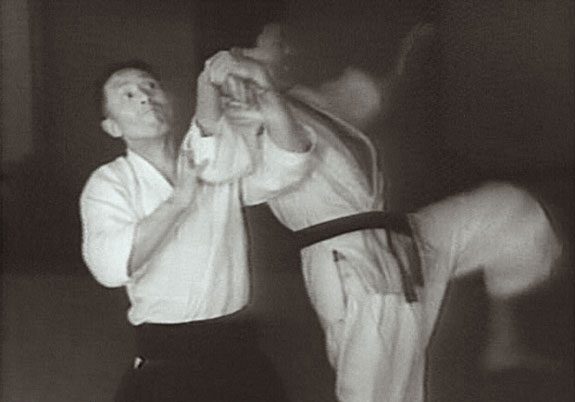

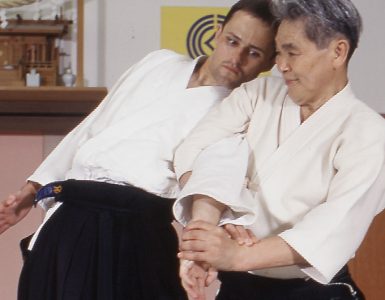
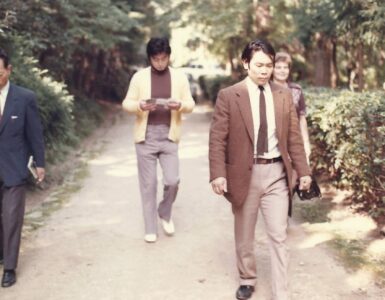
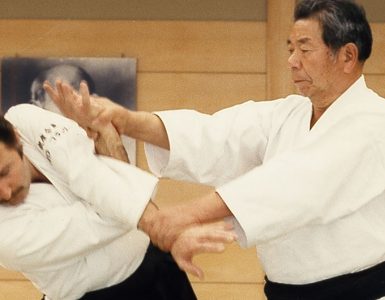

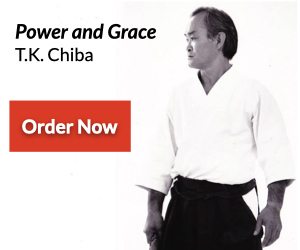
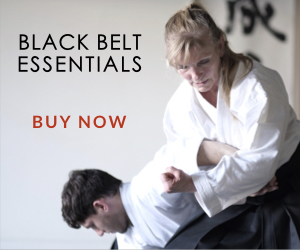




This contains more fascinating details from the author of ‘Aikido Shugyo’, old Master Shioda. I have to admire his willingness to discuss the pitfalls of American occupation, even if his audience was most likely Japanese readers. This was the reality of post-war Japan when The Founder was settled in Iwama.
My favorite part from ‘Shugyo’ is when he quotes O-Sensei as saying to him: “In a real fight, Aikido is 70 percent atemi and 30 percent throwing” (pgs 17-18).
Dear Josh,
Thanks for reposting this fascinating interview. I have always greatly admired Gozo Shioda Sensei since the first time I ever saw films of him decades ago.